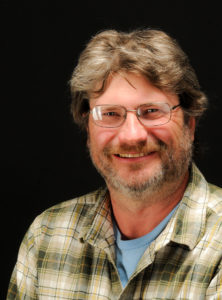
Michael Petronis
Las Vegas, N.M. – Highlands University geology students will have the opportunity to conduct research in Central Europe that will shed new light on how extinct volcanoes grew, thanks to a National Science Foundation grant.
The three-year $250,000 NSF grant is titled From the Roots to the Roof: the Anatomy of Volcanoes. It will fund five Highlands students per year for summer research in the Czech Republic, Germany and Poland.
“This kind of research is important because understanding the ancient volcanoes can help predict eruptions in active volcanoes worldwide,” said Highlands geology professor Michael Petronis, the principal investigator, or lead researcher, for the grant. “What’s new about this NSF grant is that our students will be teamed with European faculty mentors and Ph.D. students, immersing them in the nuances of European science exploration methods.”
Petronis said the Highlands geology students will use new research techniques to image and map the deepest parts of extinct volcanic systems.
“Natural erosion and medieval to modern quarrying activity have unearthed many volcanoes in Central Europe. We are looking to challenge long-standing volcano growth models. The students will also study how ancient mountains grew and then subsequently collapsed in this area,” Petronis said.
The research partnership includes scientists from France, Poland, Czech Geological Survey, Czech Academy of Sciences, and Charles University in Prague.
Petronis said the grant funds an exciting cross-disciplinary component, with Highlands University media arts students documenting the research process on-site.
“This grant is a rare opportunity for our media arts students to go to countries that were once behind the Iron Curtain and meet scientists from other cultures,” said Kerry Loewen, Media Arts and Technology Department chair. “The students will be interpreting different volcanic systems and research through film and still photography in a way that is accessible to the general public and educators.”
Loewen said some of the students’ short-form documentaries will be filmed with a 360-degree virtual reality camera.
“While traditional filmmaking is based upon what the camera looks at, with virtual reality films the audience is immersed in the environment and action of the video,” Loewen said.
Loewen is co-principal investigator for the grant along with Jennifer Lindline, Highlands geology professor and Natural Resources Management Department chair.
“This grant will build our students global competency and immerse them in Central European culture,” Lindline said.
Most of the geology students will be graduate students and will use the research for their master’s degree thesis. Undergraduates will develop their senior research projects around the European field experiences.
Over the years, Petronis and Lindline have secured National Science Foundation and other grants to take 14 students to Europe for geologic research.
Jeff Falance, who graduated cum laude from Highlands in December 2016 with a bachelor’s degree in geology, is one of those students. He joined Petronis, Lindline and European scientists in the Czech Republic to study volcanoes in 2016.
“It was an incredible once-in-a-lifetime learning opportunity to conduct international research,” Falance said. “The purpose of the research is to expand our understanding of diatreme volcanoes, which are characterized by short-lived but violent initials explosions when magma intersects the water table.”
Falance said he learned new fieldwork techniques that help paint a bigger picture of the volcano’s history.
“This international research experience makes me more marketable to employers. I’m very grateful for how hard Dr. Petronis and Dr. Lindline work to involve students in meaningful and exciting research. They were very invested in me and my future,” Falance said
